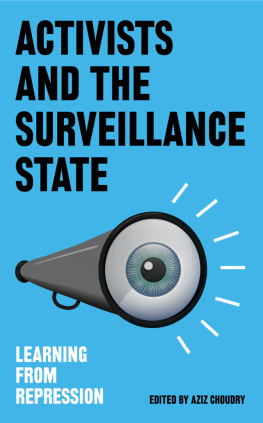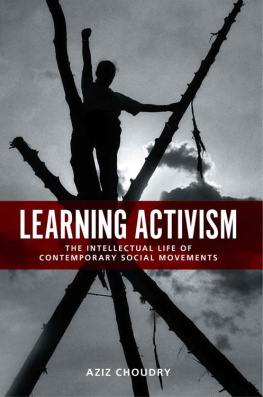Contents
Guide
Activists and the Surveillance State
Activists and the Surveillance State
Learning from Repression
Edited by Aziz Choudry

First published 2019 by Pluto Press
345 Archway Road, London N6 5AA
www.plutobooks.com
Copyright Aziz Choudry 2019
The right of the individual contributors to be identified as the authors of this work has been asserted by them in accordance with the Copyright, Designs and Patents Act 1988.
British Library Cataloguing in Publication Data
A catalogue record for this book is available from the British Library
ISBN 978 0 7453 3781 4 Hardback
ISBN 978 0 7453 3780 7 Paperback
ISBN 978 1 7868 0372 6 PDF eBook
ISBN 978 1 7868 0374 0 Kindle eBook
ISBN 978 1 7868 0373 3 EPUB eBook
Published in Canada 2019 by Between the Lines
401 Richmond Street West, Studio 281, Toronto, Ontario, M5V 3A8
www.btlbooks.com
Cataloguing in Publication information available from Library and Archives Canada
ISBN 978 1 77113 435 4 Paperback
ISBN 978 1 77113 437 8 PDF eBook
ISBN 978 1 77113 436 1 EPUB eBook
This book is printed on paper suitable for recycling and made from fully managed and sustained forest sources. Logging, pulping and manufacturing processes are expected to conform to the environmental standards of the country of origin.
Typeset by Swales & Willis
Simultaneously printed in the United Kingdom and United States of America
Contents
Acknowledgements
Drawing from the knowledge of activists and critically engaged academics, this book asks what people did, didnt, could and should learn about the power of states and capital from activists/movements viewed as threats to national security and targeted by state (and state-corporate) security operations, harassment, surveillance, infiltration and disruption, highlighting lessons learned and missed opportunities. The idea for a book of this kind has been percolating for many years in countless conversations, discussions and debates with a wide range of people, stretched across cities, countries and continents as well as in reflections on my own and others experiences. I am blessed with a great network of friends and comrades with whom to think and act.
I deeply appreciate the contributions of all of the chapter authors. This is not an easy topic to write about, not least for those whose lives have been, or are directly impacted by state surveillance, harassment, infiltration and worse. But this book is also a testament to the historical and ongoing resistance of ordinary people to the national security state.
Many thanks to David Shulman at Pluto Press for his interest in, and enthusiasm for this book project, and to the rest of the Pluto team for their production and design work. My heartfelt gratitude also goes to Dsire Rochat whose careful preparation of the manuscript for publication embodied editorial assistance par excellence. Sincere thanks to Jeanne Brady for her careful and efficient copy-editing, and Adam Bell at Swales and Willis for his help in the production of this book. I also acknowledge support from my Canada Research Chair in Social Movement Learning and Knowledge Production.
While working on this book, my friend, colleague and comrade Abby Lippman passed away. We had had many conversations, over several years, over cups of tea at her kitchen table, and on marches and demonstrations on the streets of Montreal, about the issues, struggles, politics and histories in this book. Having shared the proposal with her, I had imagined that she would read the final product, hopefully with interest, with her usual sharp eye and mind, dry sense of humour and generosity of spirit. This book is dedicated to Abby.
All royalties for this book will be donated to The Right2Know Campaign (South Africa). Website: https://www.r2k.org.za
PART I
1
Lessons learnt, lessons lost
Pedagogies of repression, thoughtcrime, and the sharp edge of state power
Aziz Choudry
The use of secret police and state security intelligence agencies to disrupt, undermine, divide and rule political opposition to the prevailing social political and economic order has a long history. This is true in liberal democratic states, as elsewhere. People have also always resisted these and other forms of repression. As Radha DSouza argues in why this keeps happening in states which claim to be democracies. While there has been important documentation of state repression against a number of historical and ongoing social struggles, the question of lessons learnt (and missed) by activists from such experiences has been far less explored. The chapters in this book critically share and engage with activist understandings of, and resistance to state security practices, including critiques of the state which are informed by reflection upon, and confrontation with these forms of repression and surveillance.
Over time, different forms of political dissent in liberal capitalist democracies have been constructed as subversion, extremism, terrorism and radicalism. No factual basis is required to label an individual or a group as subversive, extremist, or terrorist. For example, the term subversion has notoriously flexible parameters, especially when employed within an operational culture which frequently equates challenges to prevailing political and economic orthodoxies with criminality. The enemy of the state may change, but the concept of national security remains elastic enough to be applied as needed to protect the interests of the ruling elites of the day and thereby complement other coercive state practices (Kinsman, Buse & Steedman, 2000; Kinsman & Gentile, 2010). This ruling perspective routinely constructs political dissent, ideas and ideologies that challenge the prevailing social, economic and political order as criminal activity, a threat to national security and/or violent extremism. Meanwhile governments and businesses (and often in collaboration) continue to expend massive public and private sector resources for surveillance, infiltration and other forms of covert operations, targeting activists and social movements, in the interests of protecting capital and state power (Smith & Chamberlain, 2015; Lubbers, 2012; Seigel, 2018). Theirs is an acronym and codename-filled world of agency names, programmes and initiatives, from COINTELPRO to PROFUNC, to ECHELON.
State or corporate spying, infiltration, the use of informants and agents provocateurs, profiling and intimidation do not necessarily succeed at producing compliant subjects. Nor, for many people, are national security regimes and state security agencies detached from their everyday lives. For those who are surprised at the role of military/defence intelligence in multi-agency state security teams, committees, programmes and taskforces, or in surveillance of activists and social movements, we might recall the long history of the police and military working together inside ).
Serges (2005) account of Okhrana (Tsarist police) surveillance and state repression in early twentieth-century Russia reminds us that the criminalisation of dissent and state surveillance, including techniques familiar to many activists, pre-date the Cold War and 9/11, which are often seen as key dates marking the start or expansion of the security state. For example, I was politicised during the Cold War, and grew increasingly aware of state spying on, and infiltration and disruption of, anti-nuclear, anti-apartheid, Irish solidarity and Indigenous activism, at least in the UK, Australian and Aotearoa/New Zealand contexts. I also became conscious of apartheid South Africas state security dirty tricks worldwide, institutional racism within the police and concerns about collusion between British security forces and loyalist paramilitary organisations in Ireland (see also McGovern, 2015), while on the other side of the world, French state security agentsthrough moments of political confrontation, in order to change it. This can happen when the states repressive structures are laid bare when we come up against them. Material experience forms our learning and consciousness. Experiences of state repression can help direct analysis of state power and the interests of capital from the standpoint of those targeted. But a combination of experiential learning with other forms of critical knowledge and political analysis is needed to better understand what lies beneath state surveillance, build a broader politics of resistance, and learn from history.











